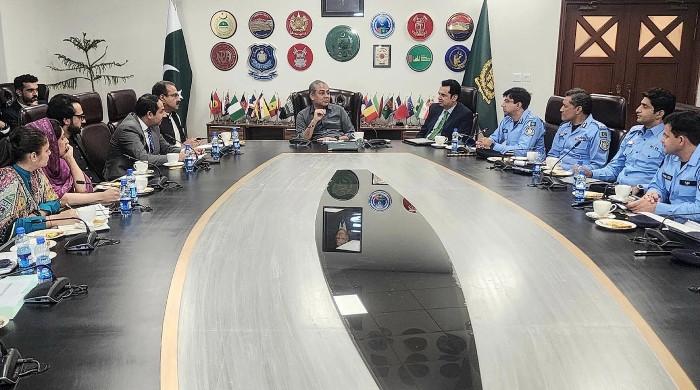Muharram Security Plan Discussed, Decisions on Mobile Service Suspension to Be Made with Provinces
ISLAMABAD: The determination of whether to suspend cellular or internet services during Muharram-ul-Haram will be made in conjunction with the provinces. This decision was reached during a meeting presided over by Interior Minister Mohsin Naqvi, which aimed to evaluate the national security strategy.
The meeting involved a review of the security measures planned for Muharram across all provinces, encompassing Azad Jammu and Kashmir (AJK), Gilgit-Baltistan (GB), and the federal capital, Islamabad. Participants concurred on the need for stringent measures against those disseminating religious animosity via social media.
Naqvi communicated that all essential actions and resolutions pertaining to Muharram security would be implemented through collaborative dialogue. He guaranteed that the federal government would offer comprehensive assistance to uphold peace throughout the religious observance.
He further underscored that no individual will be permitted to incite disturbance or participate in undermining activities. Naqvi stated that the enforcement of the code of conduct during Muharram would be ensured and noted that processions and assemblies would be overseen with advanced technology.
The meeting featured briefings from the inspectors general of police and interior secretaries representing the provinces, AJK, GB, and Islamabad. In attendance were Minister of State for Interior Talal Chaudhry, the Interior Secretary, and the Acting Chairman of the Capital Development Authority (CDA).
Also present were the Commandant of the Frontier Constabulary, Deputy Commissioner Islamabad, and DIG Islamabad Police.
DG Rangers Sindh and high-ranking officials from law enforcement agencies joined via video conference, along with IGs of police, interior secretaries, and DGs Rangers from all provinces, AJK, and GB.
Separately, the Ulema-Mashaykh Peace Conference took place in Islamabad under the patronage of the Council of Islamic Ideology. Dr. Raghib Naeemi chaired the event, which saw participation from religious scholars across various schools of thought.
A joint declaration released post-conference affirmed that every citizen must honor their pledge of allegiance to the Constitution and the State of Pakistan. It asserted that the Constitution guarantees each citizen the entitlement to assembly, belief, and worship. It also acknowledged the entitlement of citizens to peacefully pursue the implementation of Shariah.
The declaration further maintained that militant actions, violence, and turmoil against the State are forms of insurrection. It appealed to citizens to fully back Pakistan’s armed forces and promoted the rejection of movements rooted in linguistic, regional, or sectarian prejudices.
The declaration conveyed that the State reserves the right to take decisive action against those propagating hatred and that compelling one’s beliefs onto others through coercion constitutes a manifest infringement of Shariah. It also cautioned that any public or private educational institution discovered providing military instruction would face consequences.
Moreover, the declaration advocated for initiatives to combat extremism and sectarianism. It emphasised that no person should denigrate Khatam-un-Nabiyyin (the Seal of the Prophets), the Companions, or the Ahl al-Bayt. Furthermore, it stressed that no individual should pronounce another as an infidel (takfir).



Comments (0)
No comments yet. Be the first to comment!
Leave a Comment